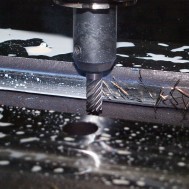Computer Numerical Control, or CNC machining, is a manufacturing process in which pre-programmed computer software controls the movement of factory tools and machinery. This program is generally used for cutting, grinding and milling machines to carve out specific shapes in stock material.
When it comes to rubber manufacturing, CNC machining is used to cut flat metal stock into rubber molds. These molds are then used to manufacture standard and custom rubber o-rings, prototypes and other sealing devices.
Here’s a closer look at the CNC machining process.
How It Works
Similarly to 3D printing, CNC machining relies on digital instructions from Computer Aided Manufacturing (CAM) and Computer Aided Design (CAD) files. CAD software is first used to create a digital 3D model of the designed part. Once approved, this model is transferred over to CAM software. The CAM program then uses the 3D design to create a tool path for CNC software to follow. Once the tool path is established, CAM software feeds the CNC program instructions to begin the machining process.
CNC machining can cut almost any type of material you need. Some of the most common materials include:
- Steel
- Brass
- Copper
- Aluminum
- Titanium
While rubber manufacturers typically use metal materials for molding, CNC machining can also be applied to wood, foam, fiberglass and plastic.
Benefits of CNC Machining
By automating a technical and labor intensive process, CNC machining makes the complex task easier to complete. This technological advancement naturally improves productivity and efficiency on the factory floor. Other important benefits that CNC machining can provide include:
- Increased speed with automated cuts
- More accurate cuts than human input
- Tighter tolerances
- Quick turnaround times
- Supports on-demand production of one-off parts or prototypes
While CNC machining is a relatively expensive investment, integrating automation on your factory floor can reduce labor costs and allow you to complete a larger number of projects in a short period of time.
Apple Rubber utilizes CNC to create rubber molds for sealing solutions and custom prototypes. Our facility holds several vertical CNC machine centers capable of machining components as large as 28” x 60” at spindle speeds up to 60 thousand RPM. Additionally, our turning department utilizes both CNC and manual lathes capable of turning components from microminiature inserts to large mold plates. Learn more about our CNC machining and mold making capabilities here.
Want to talk more about CNC machining?
Tweet us @AppleRubber to continue the conversation.
